- Home
- Darrell Maloney
An Unwelcome Homecoming Page 2
An Unwelcome Homecoming Read online
Page 2
Just in case their house was looted while they were gone Kristy left a couple of food items and three bottles of drinking water in the kitchen cupboard.
Her thinking was that the average looter would look there first. They always did.
That same average looter, when seeing half a box of spaghetti noodles and a can of Ravioli, would assume that was all the food they had.
He’d likely take both items, and the three bottles of water right next to them, and slink away to the next house.
He’d likely never think about crawling into the attic to look inside the ventilation ducts for additional food.
Or in the wall behind a boy band poster.
Or inside an upside down box spring on a made bed.
It could happen.
But hopefully it wouldn’t.
As they walked down the alley in a light drizzle Kristy told her about her friend Ashton.
“He was heavily into computers. But not computer games, like the other boys. He was into the computers themselves. How they ran and how to program them and that kind of stuff.
“He was always writing code, and would carry scraps of paper in his pocket with codes on them for various programs he was writing.
“He created his own video games, but once he had the bugs worked out of them he gave them to his friends to play. He was into creating them, not in playing them.
“The other thing he was into was guns. He had an uncle, or maybe a cousin, I don’t remember which, but they went to the firing range every Saturday to shoot their guns.
“He told me once that was his favorite thing to do, because he pretended the target was his father.”
“Why did he hate his father?”
“His father blamed him for his mother’s death.”
“What? Why?”
“Ashton was their only child. And there was something wrong with her… internally, I mean. Giving birth to him almost killed her. She was in the hospital for three months after he was born, and when she finally went home was addicted to pain killers.
“He had very few memories of her. Mostly he knew her by the things his father told him about her. He said she was never the same person after Ashton was born. She was always in incredible pain or strung out on pain pills.
“She overdosed when he was three years old and died.
“He said one of the few memories he had of his mom was at her funeral. He said he didn’t understand what was going on, but distinctly remembered his father telling him, ‘Your mama’s in that box and you’re the one who put her there.’
“He was abused his whole life. His father turned to alcohol and lost job after job. He used to hide in the crawlspace beneath his house every Friday night, because more often than not his dad would come home drunk. If he was there he’d get beaten.
“In the winter, when it was too cold to hide beneath the house, he always stayed at a friend’s house. It wasn’t easy because he didn’t have many friends, and eventually the parents of those he did have told him to quit coming around.
“He was so looking forward to graduating so he could join the Army and go away forever. He said he didn’t even plan to tell his father he was leaving. He was just going to vanish and make his father wonder where he went.
“Then the power went out and I never saw him again.”
Chapter 3
“Are you sure you remember where he lives?”
“Yes. The bus used to drop him off right at his house, because he lived on the corner. I saw his father hanging out on his front porch once, holding a leather belt with an angry look on his face.
“I begged Ashton to stay on the bus and not get off. I said he could get off at my stop. That I’d drop off my backpack and we could walk to the park. Maybe hang out there until his dad got over being mad.”
“He looked at me and laughed. Not a funny kind of laugh. Kind of a morbid one.
“He said, ‘Dad doesn’t ever get over being mad until he takes a pound of my flesh.’
“I’d heard that term before, a pound of flesh, but wasn’t sure where. I think it may have come from the Bible. Anyway, I asked why his dad was so mad and he said it was because he poured half a bottle of his dad’s whisky down the drain before he left for school that morning. So now he must accept his punishment.
“I begged him not to get off the bus but he did anyway.
“The next day in school I asked if he got beaten. I couldn’t see any bruises on his face or arms, but he walked very slowly and deliberately, like he was in a lot of pain. He told me later his father knew where to beat him so the bruises didn’t show.
“I remember asking him why he didn’t fight back. I mean, he was almost as tall as his father. If he fought back he might be able to send a message to him that he wasn’t going to take it anymore.
“He looked at me with tears in his eyes and said, ‘He told me once a long time ago that it was totally up to him when I would live and die. And if the time ever came when I got the best of him he’d just kill me. He said he didn’t care if he spent the rest of his life in prison, because I ruined his life when I killed my mom anyway.’
“I told him that was crazy. I asked him why he didn’t run away from home.
“He said, ‘Can’t you see? I have nowhere to go.’”
They walked another half block until they came to an intersection.
A decrepit blue house stood on the northwest corner, its single car driveway sloping up a slight incline to the garage.
It was the only house of the four at the intersection which rested on a hill, as though it stood sentinel over the others. Other than that, though, there was nothing special about it. It looked like all the others. The yard was overgrown with weeds. There was a car parked in the driveway with a thick coating of dust and grime on it.
As they walked up to it, Kristy tried to figure out what to say if Ashton didn’t open the door, but his father did instead.
She’d be courteous, she decided, and hold her tongue. She’d resist the urge to tell him he was a monster.
Civility was always the best course of action, she believed, until it became clear civility wasn’t going to work.
They reached the front porch and the girls saw something they hadn’t expected.
The front door was closed but not latched. It wouldn’t latch any longer because of the damage someone had done to it, forcing it open with a crow bar.
The front porch had been littered with trash, and wrappers from food containers, empty beer cans and broken beer bottles.
It looked like all the other houses in the neighborhood which had been looted.
“This doesn’t make any sense,” Kristy said to Angela.
“This is what happens to houses people abandoned. Not to houses which are occupied. Especially when they’re occupied by people who have and know how to use guns.
“If they tried to break in here, Ashton would have shot them. His father surely would have too. How did…”
She never finished her thought.
Instead she pushed the front door open.
It groaned and creaked. Just like in the horror movies she once watched on late-night television.
She called out, “Ashton? Ashton, are you here?”
She was hesitant to proceed. As many vacant houses as she’d searched through in recent months she’d never gone into one she knew belonged to a friend.
There were two instances where she was inside a house and saw a corpse or something else which belonged to an old school friend, but she was unaware they lived there until that moment.
In this case she knew this was once, and likely still was, Ashton’s domain.
She felt unwelcome.
She felt like a trespasser.
“Ashton,” she called out again. Then, “Is anybody here?”
Not even a whisper.
She pushed open the door and stepped into the living room.
It was trashed.
Not unusual for a home which had been looted s
everal times by people scrounging for food or valuables.
At the same time, though, this looked different.
This looked like a house that belonged to people who lived their lives in grime. Coffee tables which were covered with empty beer cans. Fast food wrappers and empty cans of chili and pasta on the floor. Half eaten TV dinner trays on the couch, crusty forks still resting in them.
It was the house of a man and a teenaged boy who made no effort at all to maintain even a minimum level of cleanliness. A pair of slobs who’d rather live in filth than clean.
“I wonder what happened to them,” Angie said, and then opined, “Maybe they just left to find food and stumbled across a better place to live.”
“Yeah, maybe,” her sister said.
There were things they found as they searched through the house that were disturbing.
An open pocket knife with what appeared to be blood on it.
A bloody white t-shirt on the kitchen table.
Two suitcases packed full of Ashton’s clothes, as though he were packing up to leave and forgot to take them.
Whatever happened in this house, she decided she’d likely never see her friend Ashton again. She shed a single tear.
She said, “I’ve seen enough. Let’s go to the stash house and get some food. Tomorrow we’ll try our luck at Melissa’s house.”
Chapter 4
On a sapphire blue lake a mile or so east of Blanco, Dave watched little Beth bait her hook.
He was impressed; she’d come a long way from the girl who refused to touch the “icky” worms and cried and complained until Dave did it for her.
She was trying to earn points in an old man’s eyes; trying to convince their new friend Woody she wasn’t the sissy he told her she was.
It was a crisp Friday morning; the third Friday in a row the three of them piled into Woody’s fishing boat and got their lines wet.
Dave was skeptical at first.
He thought the lake would be played out, so long after the blackout, when so many people were scrambling each and every day to find something to eat.
“Oh, no,” Woody told him.
“For one thing, only the locals know about this lake. It’s more than a mile off the highway and was never built up as a tourist attraction. To get to it from the highway you’d have to travel down several dirt roads, some of which cut across private property.
“Since only the locals even know about the lake, and since there aren’t many locals who fish it, they don’t take enough fish from it to delete the fish population.
“I’ve always looked upon this lake as Blanco’s private paradise.
“Hell, it don’t even have a name, as far as I know.
“Second, it’s big for a lake in these parts. More than four acres, I reckon. And it’s deeper than hell.
“Back in the forties folks cooked a lot of moonshine in these parts.
“I’ve heard stories of revenuers and rival moonshiners disappearing occasionally, never to be seen again. Sometimes their hats would be found, floating on the shores of this lake. But nothing else would ever surface.
“I reckon if anybody ever dived to the bottom of the lake they’d find several skeletons, still chained to anchors and rocks and things.”
Beth made the “yucko” face Dave had seen a thousand times. Dave smiled.
“Somebody told me parts of the lake are over two hundred feet deep. Now I doubt that, since none of the valleys around here are that deep.
“However, there are plenty of valleys and gullies that are a hundred feet or better, so that’s much more likely.”
Still, Dave wouldn’t get his hopes up until he saw an actual fish which was big enough to eat.
And Woody didn’t let him down, pulling in a nice sized smallmouth bass after only half an hour on their first time out.
“This one’s a definite keeper,” he said. “The lake’s mostly perch, though. And some black crappies. So don’t get your hopes up you’re gonna pull in a bass every time. She sure is a pretty fish, ain’t she Little Bug?”
Little Bug was Beth. And while she was long past being little she liked the new nickname.
“Yes, sir. She’s pretty as long as you clean it and not me. To me a fish isn’t really pretty until it’s cooked and on my plate.”
She felt a shiver.
The bright red stocking cap she wore upon her tiny head had worked its way up and off her ears.
She pulled it back down and adjusted the blanket which covered her legs.
Dave asked her, using his own nickname for her, “You okay, Peanut?”
“Thank you, Daddy, I’m fine.”
“Sure? I can wrap my jacket around your shoulders if you want.”
She dropped her line in the water.
“Nope. I’m good.”
She stole another glance at Woody, who was looking off to the north.
“Storm’s coming,” the old man said. “We might wanna wrap it up a little early today.”
That was fine with Beth, though she didn’t tell him because she was trying to convince him how tough she was.
Instead she asked him, “How can you tell?”
It was lesson time again.
“You watch the clouds. The low ones and the high ones. If the high clouds are more or less stable or still, and the lower clouds are moving quickly beneath them, there’s a storm brewing. And the storm will come from the same direction as the lower clouds.”
“How much time do we have?” Dave asked.
“Oh, there’s no major hurry. The low hanging clouds are coming out of the north, but the northern sky hasn’t started to darken yet.
“I think we should be able to fish for a couple more hours. When the sky way off in the north starts getting dark we’ll head back to shore.”
The little girl grew silent for a moment, then antsy. It was obvious she had another question, but was hesitant to ask it.
“Was there something else, Little Bug?”
“Um… this might sound kinda stupid. But how do you know which direction is which? I mean, we’re sitting in a boat in the middle of nowhere. How can you possibly know which direction is north?”
“Some people are born with a natural sense of direction. For those who aren’t, there are some tricks you can use.
“The easiest one is by using the sun. In the morning the sun is on your east side. Picture a compass lying on the ground at your feet. Point the “E” on the compass toward the morning sun. Stand looking in that direction and north is to your left.”
She smiled. She got it.
“In the afternoon the sun is in the western half of the sky. So if you stand on your imaginary compass looking toward the “W”, north is to your right.
“There’s an old saying that moss only grows on the north side of the tree. Sadly, that’s not true of most forests. But it is true for forests that are far enough north. So if you ever find yourself in a forest in, say, Washington State or Canada and you get lost, just look for the moss. It’ll always be on the north side of the tree, because at that latitude the north side of the trees never get any sunlight.”
“What in heck is a latitude? Hey!”
At that point Beth was startled when a large fish took her line and started to run with it.
The lesson would have to be completed another time, for this fish was a fighter and commanded her utmost attention.
She was up to the task, though, and brought in a brown bass that was a bit bigger… and a whole lot prettier, than the fish Woody caught earlier.
By the time the sky darkened and the storm rolled in they’d taken several more. All in all despite the cold rain that marked the end of it, it was a pretty good day.
Chapter 5
Sarah was a bit concerned when she found out Beth was bonding so well with Woody.
Dave didn’t understand why.
“I don’t get it. He’s a wonderful guy. He reminds me a lot of my dad. And he’s got a heart of gold. He’d never ha
rm a hair on Beth’s head. And I get the sense he’d defend her to the death.”
“Oh, Dave, I know he’s a good man. And I’m not worried about him doing anything to harm her. I know that would never happen. I’m worried about her growing so close to him that if something were to happen to him… I mean, he’s seventy five years old…”
He suddenly got her meaning.
Beth grew close to Sal as they traveled across the country together. They started out on very bad terms and she despised him at first.
But she grew to love him.
She even called him “Grandpa Sal,” of her own accord and without his urging.
They were as close as any grandfather and granddaughter ever were.
Then he was shot dead by a creep for the go-cart he was riding, and Beth was almost destroyed.
They buried him on the side of the highway, halfway through their thousand mile trek.
His death was sudden, as so many were in the cruel world they now lived in.
She took it so hard she barely ate for days.
Barely spoke, either.
She cried herself to sleep each night and grew so weak she could barely keep up with her family, struggling to put one step in front of the other.
“I like Woody just as much as you do,” Sarah went on to explain. “I just worry about what she’ll do if… if God forgive something happens to him too. I mean, she just might decide that loving someone isn’t worth the trouble. She might blame herself…”
“Why on earth would she blame herself?”
“I don’t know why, Dave, but kids sometimes do.
“A week after Sal died, when she was finally starting to recover, she asked me if she had anything to do with Sal’s murder.”
“What? You’re kidding.”
“I wish I was. I never told you about it because you were dealing with your own guilt issues over Sal’s death.”
“But why would she think she was responsible for his death?”
“Well, first because she begged us to invite Sal to come with us to Texas. She said he was willing to go back to his brother’s ranch in California to live out his days, but she talked us into inviting him. She thought if she hadn’t done that he’d have headed west and would still be alive.”

 A Perilous Journey
A Perilous Journey The Yellowstone Event: Book 6: The Aftermath
The Yellowstone Event: Book 6: The Aftermath Eden Bound
Eden Bound Without Warning
Without Warning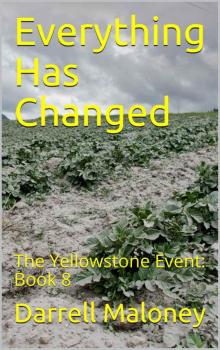 Everything Has Changed
Everything Has Changed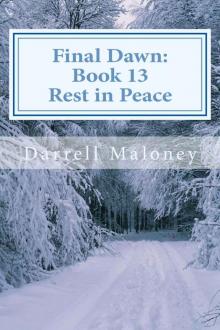 Rest in Peace
Rest in Peace This Changes Everything
This Changes Everything The Final Chapter
The Final Chapter It Can't Be Her
It Can't Be Her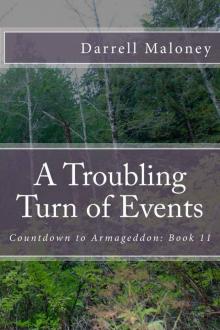 A Troubling Turn of Events
A Troubling Turn of Events The Blockade
The Blockade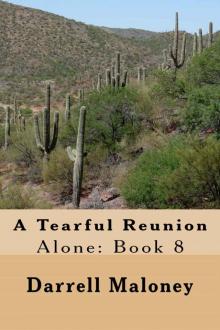 A Tearful Reunion
A Tearful Reunion Countdown to Armageddon
Countdown to Armageddon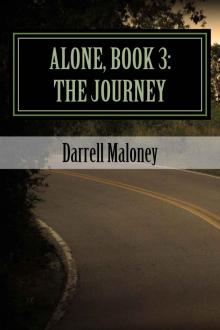 Alone, Book 3: The Journey
Alone, Book 3: The Journey The Army Comes Calling
The Army Comes Calling The Grim Reaper Comes Calling
The Grim Reaper Comes Calling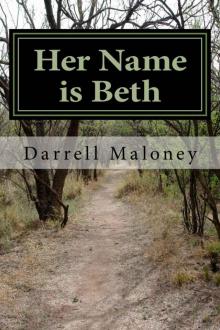 Her Name is Beth: Alone: Book 5
Her Name is Beth: Alone: Book 5 Red: The Adventure Begins
Red: The Adventure Begins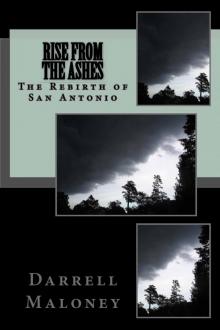 Rise From The Ashes: The Rebirth of San Antonio (Countdown to Armageddon Book 3)
Rise From The Ashes: The Rebirth of San Antonio (Countdown to Armageddon Book 3)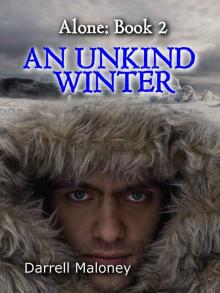 An Unkind Winter (Alone Book 2)
An Unkind Winter (Alone Book 2)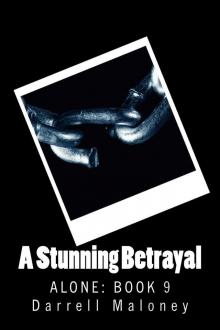 A Stunning Betrayal: Alone: Book 9
A Stunning Betrayal: Alone: Book 9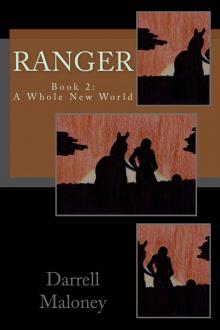 A Whole New World: Ranger: Book 2
A Whole New World: Ranger: Book 2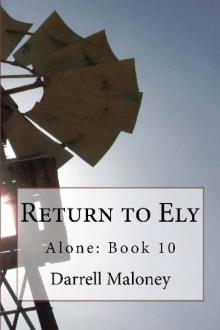 Return To Ely
Return To Ely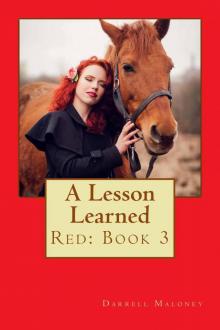 A Lesson Learned: Red: Book 3
A Lesson Learned: Red: Book 3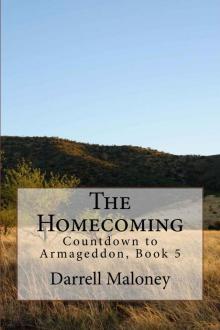 The Homecoming: Countdown to Armageddon: Book 5
The Homecoming: Countdown to Armageddon: Book 5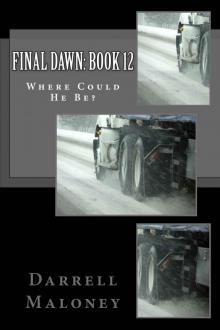 Final Dawn: Book 12: Where Could He Be?
Final Dawn: Book 12: Where Could He Be?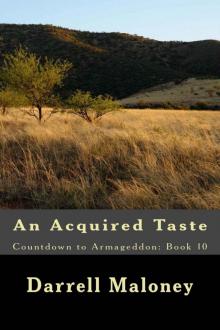 An Acquired Taste
An Acquired Taste On Desert Sands: Alone: Book 6
On Desert Sands: Alone: Book 6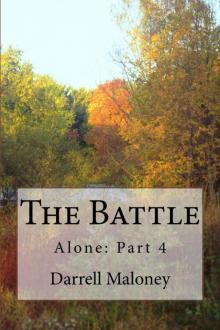 The Battle: Alone: Book 4
The Battle: Alone: Book 4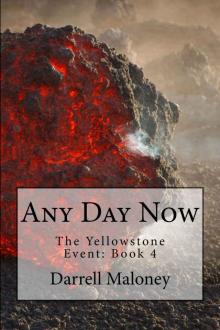 Any Day Now
Any Day Now Too Tough To Tame: Red: Book 2
Too Tough To Tame: Red: Book 2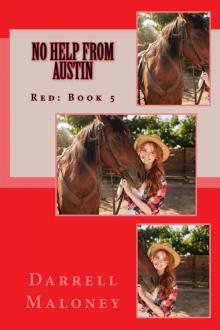 No Help From Austin: Red: Book 5
No Help From Austin: Red: Book 5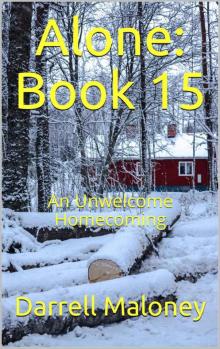 An Unwelcome Homecoming
An Unwelcome Homecoming A New Start: Final Dawn: Book 9 (Volume 9)
A New Start: Final Dawn: Book 9 (Volume 9)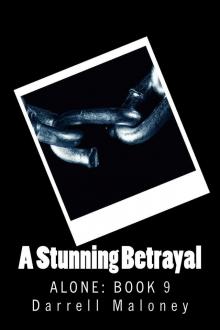 A Stunning Betrayal
A Stunning Betrayal An Undeclared War (Countdown to Armageddon Book 4)
An Undeclared War (Countdown to Armageddon Book 4) One of Our Own: Final Dawn: Book 11
One of Our Own: Final Dawn: Book 11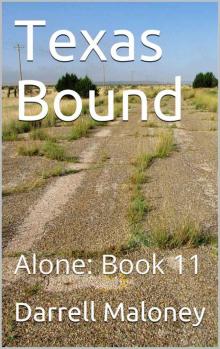 Texas Bound: Alone: Book 11
Texas Bound: Alone: Book 11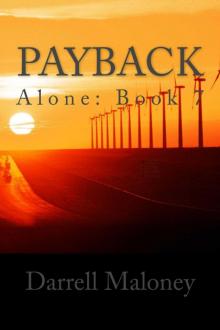 Payback: Alone: Book 7
Payback: Alone: Book 7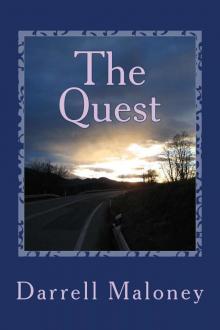 The Quest: Countdown to Armageddon: Book 6
The Quest: Countdown to Armageddon: Book 6 The Siege
The Siege The Yellowstone Event: Book 1: Fire in the Sky
The Yellowstone Event: Book 1: Fire in the Sky Return to Blanco (Red Book 4)
Return to Blanco (Red Book 4) The Search
The Search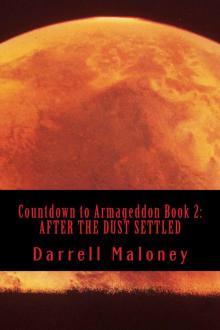 AFTER THE DUST SETTLED (Countdown to Armageddon Book 2)
AFTER THE DUST SETTLED (Countdown to Armageddon Book 2) Death Comes Calling (Ranger Book 3)
Death Comes Calling (Ranger Book 3)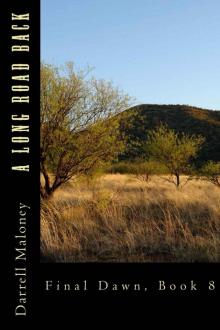 A Long Road Back: Final Dawn: Book 8
A Long Road Back: Final Dawn: Book 8